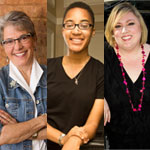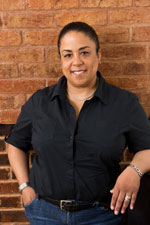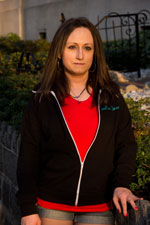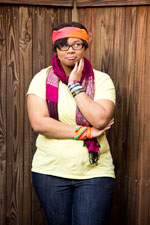
What began as a one-day LGBTA community block party on 20th Street NW is now the nation’s third-largest Pride event, featuring more than a week’s worth of entertainment, activities, and festivities. Since its inception in 1975, the Capital Pride event has provided rich opportunities for Washington, D.C.’s queer community and allies to celebrate, motivate, and support our diversity. By connecting people from across the country, Capital Pride serves as symbol of what our nation desperately needs in times like these: strength and unity.

Kimberley Bush
Kimberley Bush is the Executive Director of One In Ten, a non-profit organization dedicated to education and cultural activism on behalf of gay and lesbian people. She has served a pivotal role in the growth and evolution of the Capital Pride event. When Capital Pride was having financial difficulties, One In Ten stepped in as a co-sponsor during the mid to late 1990s. Bush introduced the Pride Film Festival, relocated the Pride event, and helped increase Pride attendance from 25,000 to more than 100,000 community members.
“One of the ways we knew we could support the efforts of Pride was to create the Pride Film Festival,” Bush explains. “Having visuals for a portion of the celebration would contribute to uplifting the community, and I knew that was my goal in working with the organization.”
In conjunction with her work at One In Ten, Bush oversees Reel Affirmations, Washington D.C.’s LGBT International Film Festival, through which she and her team are able to focus attention on and raise awareness of the issues, challenges, and successes of the LGBTQ community.
In addition to founding the Pride Film Festival, Bush was largely responsible for the relocation of the event from Francis Junior High School to Freedom Plaza. “There was something about that field that made it more at home,” she reminisces.
Now at a larger venue, participants and community members “can look at the crowd, seeing everyone happy, joyous, and unified.” Undoubtedly, this is the spirit and essence of Pride.
As one can imagine, overseeing the Capital Pride event is both challenging and rewarding. “We were and still are a small arts organization. I know it was a lot for us to do, but we were very proud to be able to help contribute,” says Bush.
In addition to increasing attendance exponentially, Bush and her team were able to bring on more corporate sponsors and take Pride to the next level.
“National companies are now getting involved. They are getting booths and having their gay leaders in those companies staff those booths. That’s something you didn’t see in the 1990s,” she explains.
In addition to unity and support, Pride is about freedom of expression and self-affirmation for the LGBTQ community.
“Before we took it on, it was still an amazing event. It was a time and day when, no matter whether you’re out or still in the closet and not able to express yourself, you knew you could be with people who are just like you,” she reflects. “It was that one day when you could be free, and not have to be afraid, and not have to be ashamed.”
Throughout her time with the Capital Pride event, Bush has seen tremendous growth in education about LGBTQ issues and overall outreach to the community.
“In the ’90s, we were looked as outcasts and freaks. And when you saw Pride in the news, they would focus on only certain aspects of the community and not the fact that we are everyday people celebrating ourselves,” notes Bush. “Back then, we were looked at as odd. Now, the way the world looks at us, we are more accepted.”
Bush also serves as Outreach Coordinator for the D.C. Women’s Initiative. She hopes to see the Capital Pride event continue to grow and increase the ways in which it reaches out to women, in general; women of color; and other aspects of our women’s community.

Jennifer Hall
Jennifer Hall is Co-Chair of the Capital Pride Festival Committee. She leads a team of dynamic volunteers in planning and developing the Capital Pride Parade, Pride Festival logistics, and vendor coordination, a job that requires tremendous dedication. Hall began her involvement with Capital Pride as a member of the Entertainment Committee.
“My primary love was entertainment,” she admits. “I decided to step up in 2009, when Capital Pride Alliance took over, after Whitman-Walker handed over the reins.”
Hall largely credits the late Bill Miles, co-founder of Capital Pride Alliance, for her decision to step into her current leadership role. “He really showed an interest in me to come aboard and help get that entertainment focus,” she notes.
Her primary goal is to continue to redevelop and redefine the Pride event to ensure that attendees have a unique experience each year.
“Our goal has been to redevelop the Capital Pride Festival so that it’s not the same thing every year. We want to make it an event and something people are looking forward to,” Hall explains. “We don’t want people to expect the same thing every year.”
Hall and her team have redeveloped the entertainment stages in hopes of exciting attendees and reaching a more diverse spectrum of audience members.
Volunteers like Hall work diligently year-round to produce this monumental community event. “It’s a strong commitment,” she affirms. After a short break in June, volunteers begin focusing on specific committees and working on the preliminary planning stages throughout the end of year. By January, volunteers are in full force, meeting once or twice a month. By March, committee meetings are in full swing and can last up to two hours, depending on the workload and tasks at hand.
“D.C. has a very strong gay men’s culture, and the women’s culture is extremely strong and out there, but I would like to see that translated into Pride planning,” explains Hall, who hopes to see more women involved in leadership roles and the development stages of Pride.
For committee members like Hall, their hard work and tenacious efforts are rewarded when the two largest events arrive: the Pride Parade and the Pride Festival.
“Being able to stand on that main stage and see 100,000 people on Pennsylvania Avenue is worth every bit of effort that it takes to put on Pride every year,” says Hall, who has spent the past seven years working with the Capital Pride event.
In addition to uniting an entire community, Capital Pride is an opportunity to bring attention to the LGBTQ rights movement. By connecting local and national vendors with community members, Hall and her team ensure that the festival is both entertaining and educational for all.
“The Pride Festival—and week, in general—is about the community: We want people to remember it’s about equality and bringing our message to the D.C. area and the national community,” asserts Hall. She hopes that all Pride attendees enjoy the entertainment and atmosphere and develop an interest in becoming involved with the future development of Capital Pride.
She hopes to see attendees and community members celebrate Pride “365 days a year.”

Wanda George
At just 16 years of age, Ballou sophomore Wanda George has become an LGBTQ activist within the youth community, representing an entire generation of emerging leaders who will undoubtedly carry current LGBTQ reform efforts across the finish line. As a speaker, volunteer, and community activist, George has affected change within her school and local community, participating in the Capital Pride Parade and speaking at various community youth events.
George first became connected with Capital Pride through SMYAL, the Sexual Minority Youth Assistance League. After coming out around the age of 14, she began attending weekly events and Saturday programs at SMYAL, where she received the support, training, and skills necessary to cope with her sexuality and effect change within her community.
“SMYAL is like my second family,” George explains. “At first, I regretted being gay. But I got a sense of happiness from having a good support system—that’s what drew me to this program.”
Although the coming out process was difficult, she found strength and support through the organization. George has emerged as a leader in the youth movement, speaking before hundreds of people about her experience being an LGBTQ youth.
“Just recently, I attended the rally at the Supreme Court, where I spoke for SMYAL at the vigil,” she proudly states. “I talked about my first time rallying. I talked about my experience at SMYAL and how it’s helped me. I talked about my sexuality. I don’t identify as lesbian or gay—I’m pansexual.” George hopes to one day have the right to marry whomever she wants, male or female, with “no complications.”
For the past three years, George has been a participant in the Pride Parade, on both the SMYAL float and with the District of Columbia Public School System, through which she had the opportunity to meet the mayor.
“I am a Pride groupie,” she laughs. “There’s a difference between being on the sidelines versus being in it.” For George, her favorite part of Capital Pride is the parade, where she has the opportunity to see the crowd “unite and celebrate being us.”
The Capital Pride event gives youth like George the chance to have a voice and a place in our community. For George, Capital Pride is an opportunity to step out of reality and unite with others who share similar experiences.
In addition to her participation in Capital Pride, George channels her energies as a young playwright.
“My main characters are small representations of me, my world, and how I see it. It’s hard for me to express myself, but giving each character a chunk of me, I feel better,” she says.
George has already begun to receive letters from colleges and universities that are interested in having her continue her education at their schools. Because of events like Capital Pride, George has the ability to envision a brighter future for the LGBTQ community.
“It’s going to be better because right now, we are witnessing history,” she states. “Gay marriage is happening. It’s the civil rights movement all over again. We are actually fighting for something, not sitting on the sidelines. I could see every country legalizing gay marriage.”